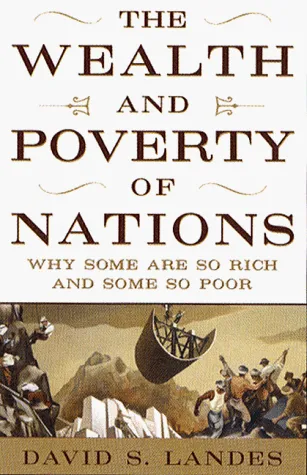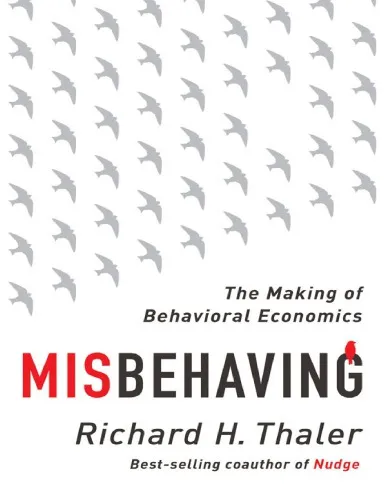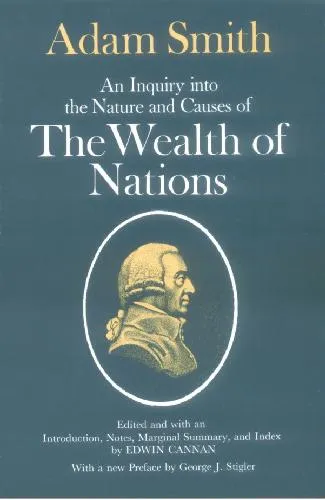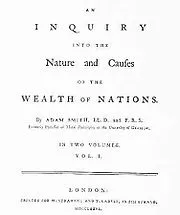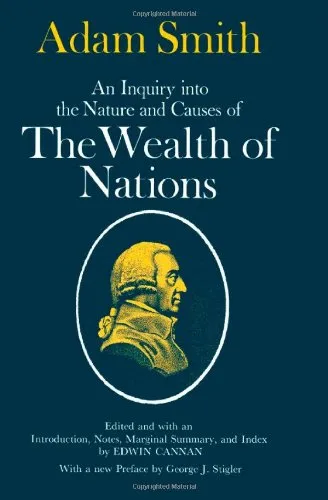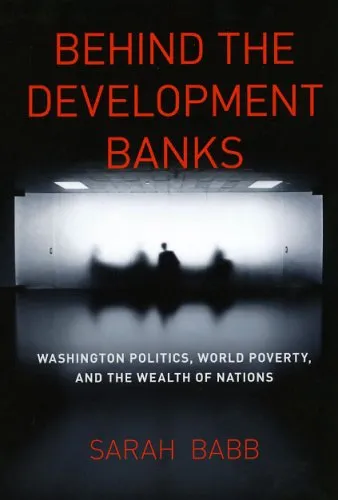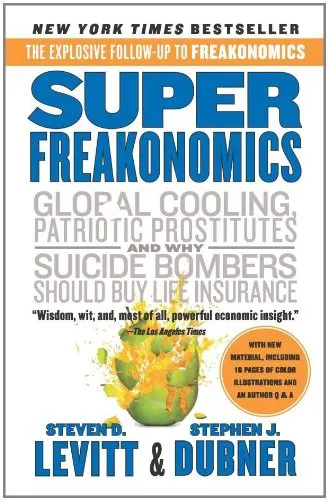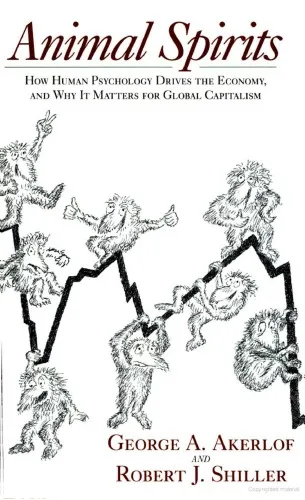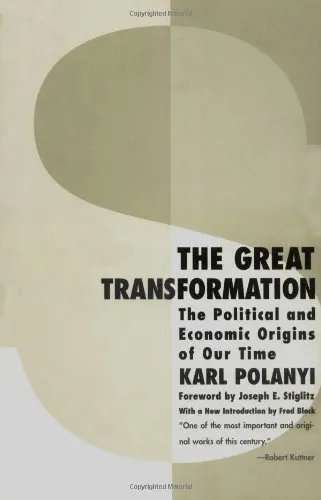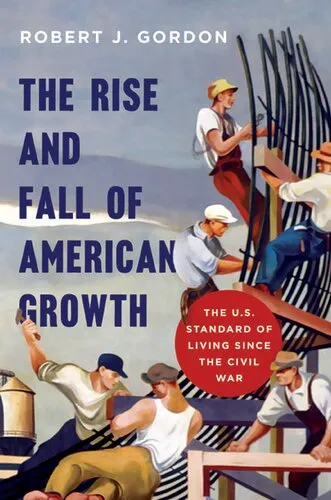The Wealth and Poverty of Nations: Why Some Are So Rich and Some So Poor
4.5
بر اساس نظر کاربران

شما میتونید سوالاتتون در باره کتاب رو از هوش مصنوعیش بعد از ورود بپرسید
هر دانلود یا پرسش از هوش مصنوعی 2 امتیاز لازم دارد، برای بدست آوردن امتیاز رایگان، به صفحه ی راهنمای امتیازات سر بزنید و یک سری کار ارزشمند انجام بدینکتاب های مرتبط:
معرفی کتاب
کتاب "The Wealth and Poverty of Nations: Why Some Are So Rich and Some So Poor" نوشته دیوید اس. لاندز، اثری برجسته و جامع است که به بررسی علل و عواملی میپردازد که برخی کشورها را ثروتمند و برخی دیگر را فقیر کرده است. دیوید لاندز با ترکیب تاریخ اقتصادی و تحلیلهای جامعهشناختی، دیدگاههای جدید و عمیقی را ارائه میدهد که نشان میدهد چگونه عوامل مختلف تاریخی، اجتماعی و جغرافیایی در تعیین مسیر اقتصادی کشورها نقش داشتهاند.
خلاصهای از کتاب
این کتاب به بررسی تاریخ اقتصادی جوامع مختلف از دوران قبل از انقلاب صنعتی تا زمان معاصر میپردازد. لاندز با نگاهی جامع به تاریخ، عوامل موفقیت و شکست ملتها را برمیشمارد، از جمله جنبههای فرهنگی، دسترسی به منابع طبیعی، دستاوردهای تکنولوژیکی، و نظامهای سیاسی و اقتصادی. او بهویژه بر روی انقلاب صنعتی تمرکز میکند و نشان میدهد که چگونه این تحول عظیم باعث شد کشورهایی مانند بریتانیا به اوج قدرت و ثروت برسند، در حالی که دیگر ملل با چالشهای فراوانی روبرو شدند.
نکات کلیدی
- فرهنگ و ارزشهای فرهنگی نقش مهمی در توسعه اقتصادی دارند.
- نظامهای سیاسی و برخورد با قانون به شدت بر رشد اقتصادی اثرگذار هستند.
- دسترسی به منابع طبیعی و جغرافیای زیستمحیطی، فرصتها و چالشهای اقتصادی متفاوتی ایجاد میکنند.
- پذیرش و نقد تحولات تکنولوژیک یکی از کلیدهای اصلی موفقیت در عرصه اقتصاد جهانی است.
نقلقولهای معروف از کتاب
"کسانی که تاریخ را نمیدانند، محکوم به تکرار آن هستند." — دیوید اس. لاندز
"ثروت یک ملت نه در منابع طبیعی، بلکه در مغز و خواستههای مردمش نهفته است."
چرا این کتاب مهم است
کتاب "The Wealth and Poverty of Nations" به دلیل تحلیلهای دقیق و جامع خود در زمینه تاریخ اقتصادی، اهمیت بالایی دارد. این کتاب به ما کمک میکند تا بفهمیم چگونه روندهای تاریخی و فرهنگی، و نیز تصمیمات سیاسی و اقتصادی، مسیر اقتصاد جهانی را شکل دادهاند. این دیدگاهها میتواند برای سیاستگذاران، اقتصاددانان، و عموم مردم بهعنوان یک منبع تحلیلی ارزشمند در جهت فهم بهتر چالشهای اقتصادی فعلی و آیندهنگری برای توسعه پایدار بهکار رود.
David S. Landes’ seminal work, The Wealth and Poverty of Nations: Why Some Are So Rich and Some So Poor, delves deeply into the economic histories that have shaped the global landscape. By exploring different cultural, geographical, and political paradigms, Landes imparts a rich analysis of the factors propelling some nations to wealth, while others languish in poverty. This profound investigation is critical for understanding the economic disparities that define today's world.
Detailed Summary of the Book
In this expansive text, Landes takes readers on a journey through time, illustrating how the fabric of societies is interwoven with economic threads. Starting from antiquity and threading through the Enlightenment and Industrial Revolution, he examines the catalysts that spurred Western nations to dominance. The narrative reveals the importance of innovation, geographical advantages, and socio-political factors.
Landes argues that cultural attitudes towards work, the accumulation of knowledge, and the embrace of new technologies have played pivotal roles. By comparing the economic trajectories of different nations, he showcases why Europe surged ahead during the Industrial Revolution while places like China and the Islamic world, with their early advancements, fell behind. The book further discusses the impact of colonialism, the rise of capitalism, and the globalization phenomena that continue to shape economic realities.
Key Takeaways
- Economic development is heavily influenced by cultural attitudes towards innovation and work.
- Geographical and environmental factors can significantly impact a nation's economic potential.
- Historical legacies, such as colonialism, have long-lasting economic implications.
- The role of political institutions and governance is crucial in shaping economic landscapes.
- Technology and its diffusion drive economic divergence among nations.
Famous Quotes from the Book
"If we learn anything from the history of economic development, it is that culture makes all the difference."
"We learn that resources and geography provide opportunities but it is culture that determines whether people seize and use them well."
Why This Book Matters
The The Wealth and Poverty of Nations holds vital insights for economists, historians, policymakers, and anyone interested in the underlying reasons behind global economic discrepancies. By emphasizing the intersection of culture and economics, Landes offers a unique perspective that challenges simplistic explanations based solely on geography or technology.
Moreover, the book becomes a crucial resource in today’s globalized environment, where understanding past economic patterns helps in addressing contemporary global issues like inequality and development. Landes' meticulous research and compelling narrative encourage readers to reflect on political and societal structures that foster economic growth or stagnation.
دانلود رایگان مستقیم
شما میتونید سوالاتتون در باره کتاب رو از هوش مصنوعیش بعد از ورود بپرسید
دسترسی به کتابها از طریق پلتفرمهای قانونی و کتابخانههای عمومی نه تنها از حقوق نویسندگان و ناشران حمایت میکند، بلکه به پایداری فرهنگ کتابخوانی نیز کمک میرساند. پیش از دانلود، لحظهای به بررسی این گزینهها فکر کنید.
این کتاب رو در پلتفرم های دیگه ببینید
WorldCat به شما کمک میکنه تا کتاب ها رو در کتابخانه های سراسر دنیا پیدا کنید
امتیازها، نظرات تخصصی و صحبت ها درباره کتاب را در Goodreads ببینید
کتابهای کمیاب یا دست دوم را در AbeBooks پیدا کنید و بخرید
1484
بازدید4.5
امتیاز0
نظر98%
رضایتنظرات:
4.5
بر اساس 0 نظر کاربران
Questions & Answers
Ask questions about this book or help others by answering
No questions yet. Be the first to ask!
